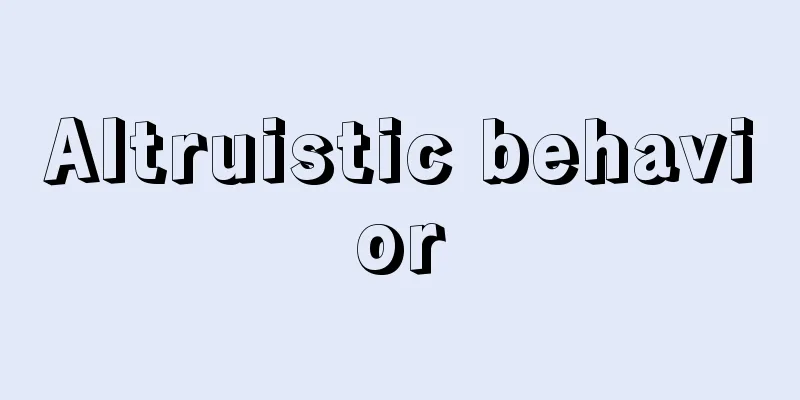Altruistic behavior

|
Also known as altruistic behavior. Behavior that benefits other individuals without considering any disadvantage to oneself. Typical examples are the raising of young and helper behavior by workers of social insects (ant and bee workers). When altruistic behavior is exchanged between individuals, such as grooming, it is called reciprocal altruism. The evolution of altruistic behavior is generally explained by the kin selection theory. → Related topics Inclusive fitness | Selfish genes Source : Heibonsha Encyclopedia About MyPedia Information |
|
利他行動とも。自らの不利益をかえりみず他の個体に利益をもたらす行動。社会性昆虫のワーカー(働きアリや働きバチ)による子の養育,ヘルパー行動が典型的なもの。グルーミングのように個体間で利他的行動がやりとりされる場合は互恵的利他行動と呼ばれる。一般に利他的行動の進化は,血縁淘汰説などによって説明される。 →関連項目包括適応度|利己的遺伝子 出典 株式会社平凡社百科事典マイペディアについて 情報 |
<<: Litani River (English spelling)
Recommend
Tiberias [Lake] - Tiberias
Also known as Lake Galilee. A freshwater lake on t...
détrempe (English spelling) detrempe
...However, after the mid-15th century, as oil pa...
bori
...But the tail does not regenerate. The mountain...
The Wolf and the Seven Little Goats - Wolf and the Seven Little Goats
(Original title, German: Der Wolf und die sieben j...
Burning - Funkei
〘 noun 〙 Punishment by burning to death. Punishmen...
Convertible bonds - Epilepsy
This was the name used before the enactment of th...
Administrative organization - gyouseisoshiki (English spelling) administrative organization
From a legal perspective, it is defined as the en...
Ouyang Orandai
…His son, Ouyang Tong (?-691, pen name Tongshi), ...
Weihnachtsmann
…Today, Santa Claus has been popularized as a kin...
Boff, L.
…[Hiroko Nori]. … *Some of the terminology that m...
Ludwigshafen am Rhein
A city in the state of Rhineland-Palatinate in so...
Endorsement license - uragakimenkyo
…This is called an endorsement, and people of hig...
Expressway - kousokudōro
Among the trunk roads that connect major cities, ...
Chosaku - Chosaku
Kabuki dance, Tomimoto-bushi. Original title: Mich...
Ostraciontidae
…A general term for marine fish of the Ostraciont...









